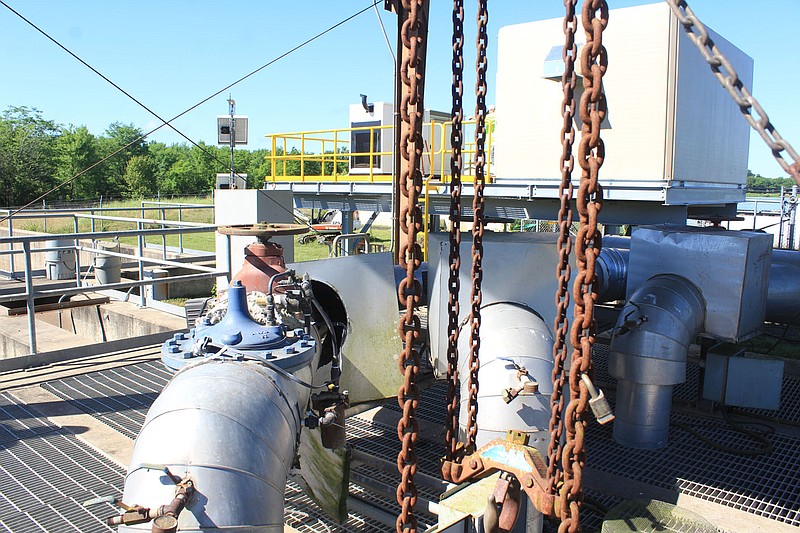FORT SMITH -- The city's utility department misses out on up to $2 million each year because of its boundary agreement with Barling.
As of June 14, 1,049 of Fort Smith's utility customers near Barling didn't pay the city for wastewater treatment because of an agreement Barling would treat its water. The customers live and operate businesses just south of Barling's southern border with the city.
The agreement awaits Fort Smith's construction of a pump station, which would send these customers' wastewater supplies to its Massard Water Reclamation Facility.
The customers instead have their wastewater treated at the Chaffee lagoons, which were designed to treat about 3.75 million gallons of water per day. Steve Core, Barling city manager, said the lagoons can take 10 days to treat that much water during heavy rain.
"I would love to have that pump station built to where we have everyone in Fort Smith going to a Fort Smith treatment facility, everyone was paying the same rate," said Lance McAvoy, Fort Smith utility director. Core said he would like Fort Smith to process these customers' wastewater to ease the burden on Barling's system.
The pump station would be a split cost between Fort Smith and the Fort Chaffee Redevelopment Authority, said McAvoy. Pump station reconstruction and replacements in the city have cost between $1.5 million and $2 million in recent years, according to projections from engineering and construction companies used by the city.
The station would send these residents' wastewater to the Massard Water Reclamation Facility, which treats wastewater from 25,000 to 30,000 residents on the east side of Fort Smith. The facility has two failing trickling filters, which will cost about $22 million to replace, according to estimates from Garver engineering group.
"They have to have the assurances that plant is not going to go down and fail, because that treats everything on the east side of town," said Core.
Until the wastewater is treated by Fort Smith, the lack of customers costs the city between $1.5 million and $2 million each year, said McAvoy. That's money that could be used to replace equipment, facilities and pipes in the ground while helping keep the city in compliance with a federal consent decree mandating sewage system improvements, he said.
"The city's not taking money from all the wastewater rates that we raise and doing stuff. That, by law, is actually required to go back to the Utility Department for infrastructure," McAvoy said.
Consent decree impact
The boundary agreement was signed more than 12 years before the city entered the decree, which addresses decades of sewage runoff into the Arkansas River.
McAvoy estimates the city will have spent "well over $600 million" in capital projects in the decree, which has 5½ years left in its timeline unless the feds grant Fort Smith a five-year extension they secured in 2020.
To pay for the improvements, the city has increased its sewer rate 167% since 2015. Attorney Paul Calamita, environmental counsel for Fort Smith, expects the city will have to increase its rates to satisfy federal Judge P.K. Holmes' position on the decree.
As a result, Fort Smith residents whose wastewater is treated by Barling pay less for water and sewer than other customers. David Leonard, who lives in the 6800 block of Maribette Road with his family, pays roughly $40 per month -- a contrast for some residential water bills in Fort Smith that exceed $100.
Leonard, a student at Arkansas Colleges of Health Education, said he would rather his bill not rise to Fort Smith's rate.
"It would all come down to end costs for me," he said.
Leonard's water and sewer bill is similar to Michael Seiter, who owns Sieter Design Co., 7402 Ellis St. in the Chaffee Crossing historic area. Seiter has washed screens at his business -- an activity that uses "a bunch of water," he said.
Seiter said he's happy with his current rate but doesn't see a problem with Fort Smith taking over utilities. He also said Fort Smith should be consistent in its services throughout the city.
McAvoy said he understands why some residents would rather pay the lower rate. But he also said he's "got to look at what's best for the city as a whole and for the region."
"If you're living in Fort Smith, you're getting Fort Smith Police Department protection, you're getting Fort Smith Fire Department protection, you're getting Fort Smith schools -- you're already paying into Fort Smith with your taxes, as are other people," he said. "The benefit should still be there for your wastewater treatment, and reliable wastewater treatment."

